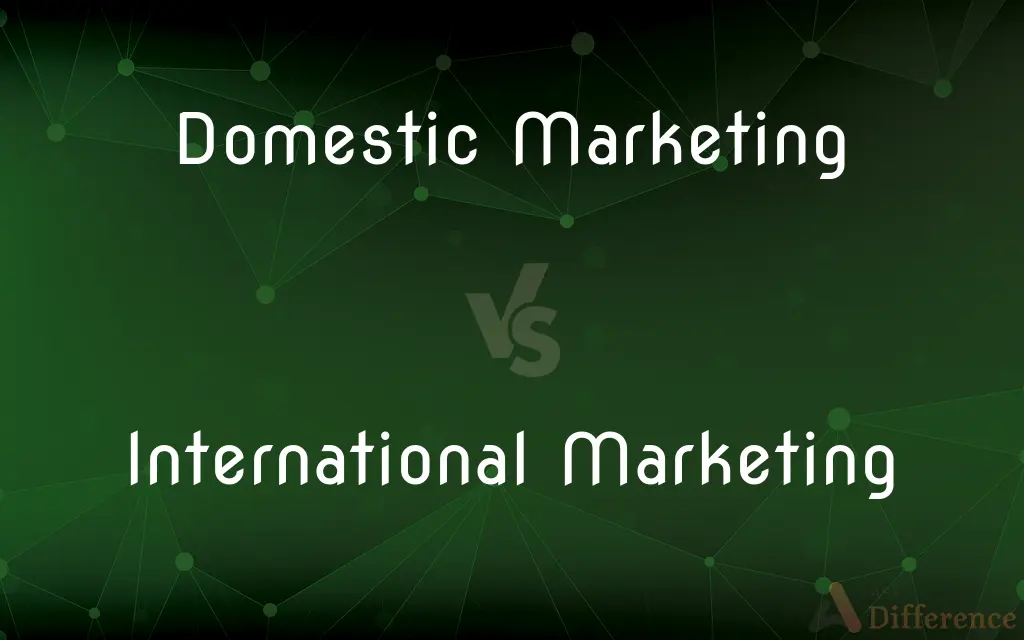Domestic Marketing vs. International Marketing — What's the Difference?
By Tayyaba Rehman — Published on October 16, 2023
Domestic Marketing refers to the promotion and sale of goods and services within the home country of the business, International Marketing extends these activities across multiple countries, adapting strategies to various cultures and economies.

Difference Between Domestic Marketing and International Marketing
Table of Contents
ADVERTISEMENT
Key Differences
Domestic Marketing implies the development and implementation of marketing strategies within the home country of the business, where the focus is on understanding and meeting the needs and preferences of local consumers. It involves a homogeneous market with relatively similar customer needs, demands, and preferences. In contrast, International Marketing encompasses activities to promote and sell products or services across multiple countries, necessitating the adjustment of marketing strategies to diverse market environments, with variations in consumer behavior, cultural norms, legal frameworks, and economic conditions.
In Domestic Marketing, businesses operate in a familiar environment, with established legal, political, and cultural norms, reducing the complexity and uncertainty in decision-making processes. International Marketing, however, poses challenges due to the diversity and dynamism inherent in international markets, requiring businesses to understand and navigate varied consumer expectations, market conditions, competitive landscapes, and regulatory constraints, often demanding significant modifications to marketing mix elements.
While Domestic Marketing strategies predominantly rely on localized knowledge, understanding the local market conditions, consumer behavior, and competition, International Marketing necessitates extensive research and insights into multiple markets, considering the cultural, social, legal, economic, and political differences that influence consumer purchasing decisions and marketability of products or services.
The scope of Domestic Marketing is usually limited, focusing on maximizing market share and profitability within national boundaries, operating under a unified regulatory and economic system. International Marketing, by contrast, extends its scope to various global markets, each with its unique challenges and opportunities, seeking to optimize performance across diverse and often contrasting market scenarios.
The adaptation is a crucial differentiation point between Domestic and International Marketing. In Domestic Marketing, standardized approaches in product development, promotion, pricing, and distribution are typically effective, given the uniformity in market characteristics. International Marketing demands a more flexible and adaptive approach, requiring modifications to marketing strategies, often involving product alterations, promotional adjustments, pricing modifications, and varied distribution channels to accommodate the disparate needs and conditions of international markets.
ADVERTISEMENT
Comparison Chart
Geographic Scope
Limited to the home country.
Extends across multiple countries.
Market Environment
Homogeneous with familiar norms.
Diverse with varying norms and conditions.
Marketing Strategy
Standardized for local consumers.
Adapted to suit varied international consumers.
Complexity & Challenges
Lower due to familiarity.
Higher due to diversity and dynamism of international markets.
Knowledge & Research Focus
Concentrated on local market conditions and consumers.
Requires insights into multiple, diverse markets.
Compare with Definitions
Domestic Marketing
Domestic Marketing is the practice of promoting products within the business’s home country.
Their Domestic Marketing strategy was focused on meeting local consumers' specific needs.
International Marketing
International Marketing seeks to optimize performance across diverse market scenarios.
Balancing standardization and adaptation is crucial in International Marketing.
Domestic Marketing
Domestic Marketing deals with a homogeneous market with similar consumer preferences and behaviors.
A thorough understanding of consumer behavior is crucial in Domestic Marketing.
International Marketing
International Marketing involves promoting and selling products across various countries.
International Marketing strategies must be adaptable to diverse consumer needs and market conditions.
Domestic Marketing
Domestic Marketing operates under a unified regulatory and economic system.
The uniformity in regulations makes Domestic Marketing less complex.
International Marketing
International Marketing focuses on global market opportunities and challenges.
The company expanded its reach through strategic International Marketing.
Domestic Marketing
Domestic Marketing focuses on maximizing market share and profitability within national boundaries.
Through effective Domestic Marketing, the company aimed to dominate the local market.
International Marketing
International Marketing requires insights into diverse markets and consumer behaviors.
Researching cultural preferences is fundamental in International Marketing.
Domestic Marketing
Domestic Marketing involves strategies developed and implemented within one country.
Their Domestic Marketing team deployed various strategies to boost local sales.
International Marketing
International Marketing necessitates adjustment to varying legal, economic, and cultural norms.
Their International Marketing team adapted promotional materials to respect local cultures.
Common Curiosities
What is the primary focus of Domestic Marketing?
It primarily focuses on promoting and selling products within the home country, understanding, and meeting local consumer needs.
Is Domestic Marketing less complex than International Marketing?
Yes, Domestic Marketing usually involves less complexity due to the familiarity with legal, political, and cultural norms of the home country.
How does International Marketing differ from Domestic Marketing in scope?
International Marketing has a broader scope, extending promotional and selling activities across multiple countries, adapting to each country’s unique market environment.
Does Domestic Marketing require extensive market research?
It requires thorough research on local market conditions and consumer behavior, but it’s usually less extensive compared to International Marketing.
Why is adaptation crucial in International Marketing?
Due to diverse consumer preferences, cultural norms, and market conditions in different countries, adaptation is crucial to meet varied needs and ensure market success.
How important is cultural understanding in International Marketing?
Extremely important, as it influences consumer behavior, preferences, and the overall acceptability of the product or service in diverse markets.
What kind of market environment does Domestic Marketing deal with?
It deals with a more homogeneous market environment with relatively similar consumer needs, demands, and preferences.
Can Domestic Marketing strategies be effective internationally?
Not always, as International Marketing often demands modifications to strategies to accommodate the disparate needs and conditions of international markets.
Why is International Marketing challenging?
It involves navigating through diverse and dynamic international markets, with varied consumer expectations, competitive landscapes, and regulatory constraints.
Share Your Discovery

Previous Comparison
Left Wing vs. Right Wing
Next Comparison
Variable Cost vs. Semi Variable CostAuthor Spotlight
Written by
Tayyaba RehmanTayyaba Rehman is a distinguished writer, currently serving as a primary contributor to askdifference.com. As a researcher in semantics and etymology, Tayyaba's passion for the complexity of languages and their distinctions has found a perfect home on the platform. Tayyaba delves into the intricacies of language, distinguishing between commonly confused words and phrases, thereby providing clarity for readers worldwide.












































